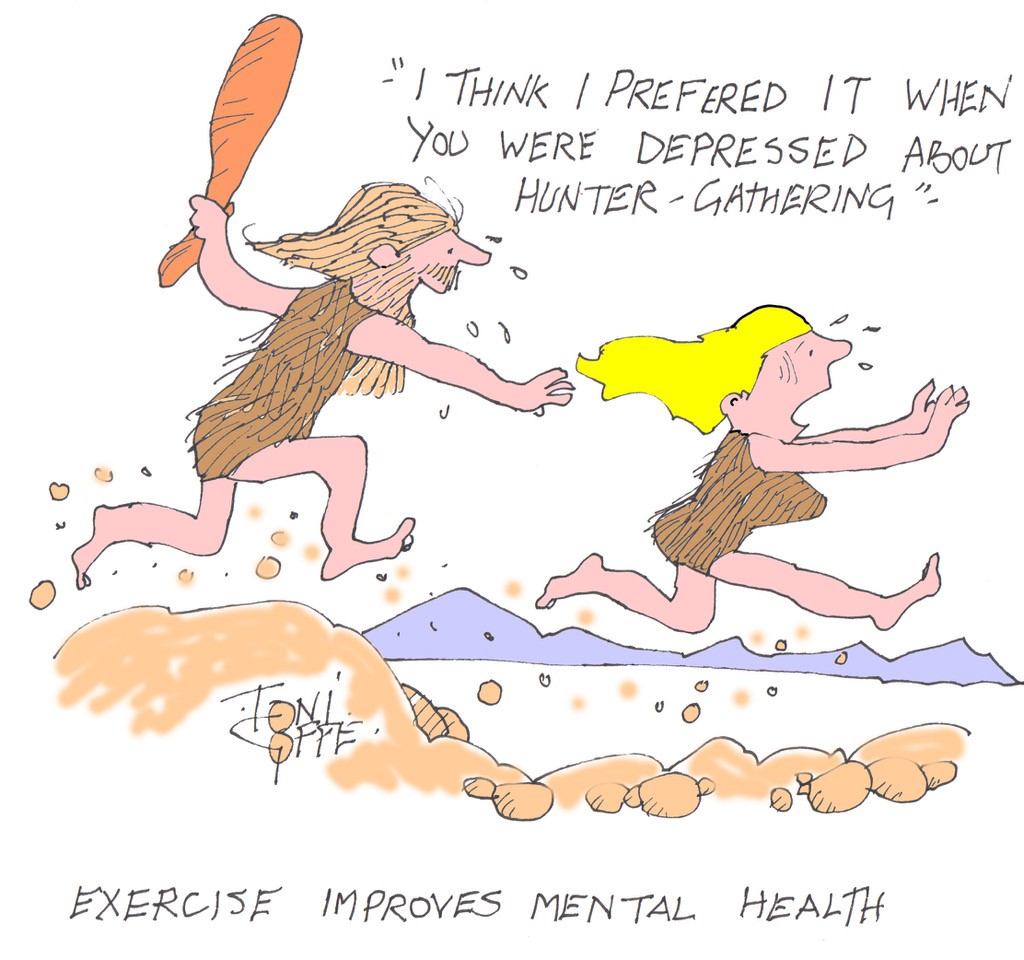Psychological ill-health Part 1
‘Mens sana in corpore sano. (Healthy mind in healthy body)’ Juvenal, c. AD 100
Psychological illnesses are extremely common. The commonest examples are depression and anxiety. A European study of depression found prevalence rates varying from 2.5 per cent in Santander to 17 per cent in Liverpool, while a worldwide study found rates of up to 29.5 per cent. Anxiety is almost as common, affecting as many as 16 per cent of the population over a lifetime. There is a plethora of other mental illnesses, but I will not be tackling them here – which does not mean that they don’t benefit from exercise!.
Why might exercise help?
One of the most effective and satisfying ways of combatting stress is ‘letting off steam’, a process which usually involves exertion in one form or another. The release of endorphins mediates this feel-good rush. Indeed, the state of anxiety or emotional arousal prepares us for effort – the heart rate, blood pressure, blood sugar all rise, which was the natural response for our wild ancestors fighting for survival. Nowadays we seldom have the option of exerting ourselves when placed under stress – no way of dissipating the metabolic consequences of the ‘flight or fight’ response. We must sit and stew.
Exercise in the prevention of psychological ill health
The preventative effects of exercise are more apparent for depression than for anxiety. A number of studies have indicated that regular exercise can reduce the risk of future depression. The most recent comes from a Norwegian study, in which 34,000 people without either mental or physical illness were followed up for 11 years and their exercise habit compared with the risk of developing psychological symptoms. Undertaking regular leisure-time exercise was associated with reduced incidence of future depression but not anxiety. The majority of this protective effect occurred at low levels of exercise and was observed regardless of intensity. The findings suggested that about 12 per cent of future cases of depression could have been prevented if all participants had engaged in at least 1 hour of physical activity each week.
How much exercise?
A number of well-conducted studies have confirmed the definite, if modest, reduction in risk of depression in regular exercisers. A 2012 meta-analysis of the association between regular exercise and subsequent depression included some 30 studies, 25 of which confirmed the association with a reduction in depression of between 8 and 67 per cent in those doing less than 150 minutes of exercise per week and 19–27 per cent in those doing more than 150 minutes. A survey of more than a million adults in the USA found that people who said they took exercise experienced more than 50 per cent fewer days of poor mental health than those who did not. The effect was greatest in those with diagnosed depression and the optimal exercise dose was 45 minutes three to five times a week. Exercising more than 3 hours a day produced no further benefit.
Which exercise?
A survey of 1.5 million people compared the type of exercise with its preventative effect . The most successful approach was the combination of moderate to vigorous physical activity (MVPA) with muscle-strengthening exercise (MSE). At the higher levels (up to 300 minutes MVPA + 2 hours MSE per week), the reduction of risk of depression was about 40 per cent. An Australian study of 14,000 men confirmed that just meeting the usual recommendation for exercise decreased the risk of future depression, but that higher levels were even more effective (this did not include extremely high levels). As might be expected, too much sedentary behaviour increases the chance of becoming depressed, particularly in young people.
Regular exercise has also been found to reduce the risk of developing anxiety by about 25 per cent, agoraphobia by 58 per cent and post-traumatic stress disorder by 43 per cent.
Finally, the effectiveness of physical activity is confirmed by the dose-response relationship between the level of cardio-respiratory fitness and the risk of becoming mentally unwell. The fitter you are, the lower the risk. For me this is the most powerful evidence.
Next week I will talk about the use of exercise in the treatment of mental illness.
 You can order a copy of my latest book here! This is directly through me for £12.50 and includes P&P.
You can order a copy of my latest book here! This is directly through me for £12.50 and includes P&P.
Alternatively, you can get in from Amazon for £14.76. The ebook version costs £4.49 but is free to KindleUnlimited members!
From Alton Waterstones for £14.99
From Alton Cardiac Rehab for £12.00 which includes a donation to the Charity 💕
“I thoroughly enjoyed reading it and, despite considering myself to have a comprehensive level of knowledge in this area, still found myself learning plenty.” Chris Tuckett, physiotherapist and associate director of allied health professions at an NHS trust.
Subscribe to the blog
Categories
- Accelerometer
- Alzheimer's disease
- Blood pressure
- BMI
- Cancer
- Complications
- Coronary disease
- Cycling
- Dementia
- Diabetes
- Events
- Evidence
- Exercise promotion
- Frailty
- Healthspan
- Hearty News
- Hypertension
- Ill effects
- Infections
- Lifespan
- Lipids
- Lung disease
- Mental health
- Mental health
- Muscles
- Obesity
- Osteoporosis
- Oxygen uptake
- Parkinson's Disease
- Physical activity
- Physical fitness
- Running
- Sedentary behaviour
- Strength training
- Stroke
- Uncategorized
- Walking


